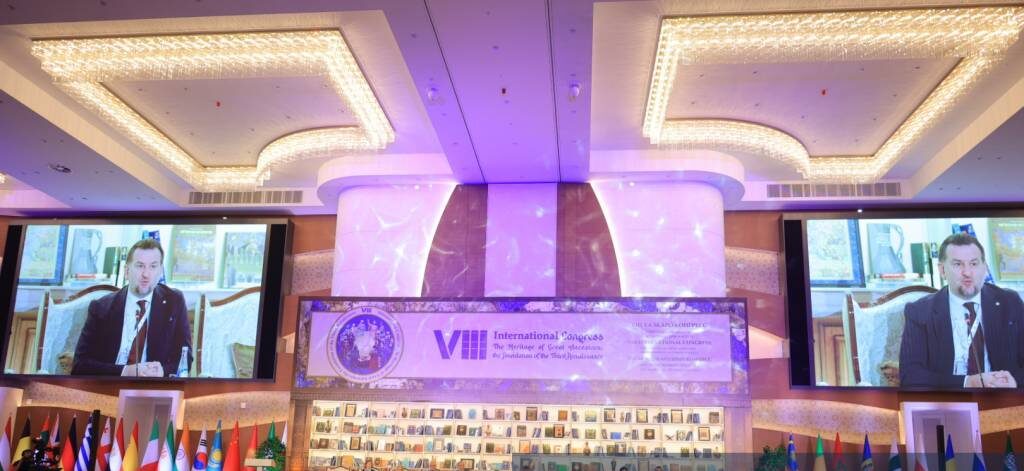WNAM REPORT: The 8th International Congress on “The Heritage of Great Ancestors – the Foundation of the Third Renaissance” was held in Tashkent and Samarkand on August 23-26. It was organized by the Center for Islamic Civilization in Uzbekistan and the World Society for the Study, Preservation and Popularization of the Cultural Legacy of Uzbekistan.
The Congress was organized with the government’s support jointly with domestic organizations such as the Academy of Sciences of the Republic of Uzbekistan and the Cinematography Agency, as well as international organizations IRCICA and TURKSOY.
The ERIELL Group provided financial and organizational support for the congress events. About 300 scientists and experts from 35 countries and representatives of major international organizations attended the events, including TURKSOY Secretary General Sultan Raev, IRCICA Director General Mahmud Erol Kılıç, and President of Turkic Academy Shahin Mustafayev.
The President of the Republic of Uzbekistan Shavkat Mirziyoyev sent a congratulatory message to the conference participants.
At the congress, 7 plenary sessions, 1 forum, 4 panel sessions, 13 scientific sections, and 4 exclusive exhibitions were organized, and more than 300 scientific reports were heard.
Together with the TURKSOY, an International Film Forum “The theme of religion and education in joint historical film projects” was held under the slogan “Enlightenment against ignorance” and plans for the future were discussed. Within its framework, a presentation of the project “Living History” was held, implemented in cooperation with the Center for Islamic Civilization in Uzbekistan and the Cinematography Agency of Uzbekistan. Following the results of the film media forum, a memorandum was signed to create a single film media platform for the countries of the Turkic world.
The scientific sensation “The Great Bactrian Wall”, the TURKSOY media and film forum, the unique exhibition platform “Masterpieces of World Facsimile Editions” and the presentation of the books “Masterpieces of Turkic Literature in 100 Volumes”, “Competitors in Intelligence, 1000 Years: How Beruni and Ibn Sina Created Their Renaissance”, the “Great Railway” project and several other scientific discoveries were presented to the attention of the international community within the framework of the congress. In addition, the presentation of 10 new volumes of the traditional series (volumes 71-80) “Cultural Legacy of Uzbekistan in World Collections” aroused great interest among the participants. These important initiatives will be supported by the signing of memorandums of cooperation with the Center for Islamic Civilization.
Following the 8th International Congress, an action plan of the Center for Islamic Civilization joint projects was approved.
At a press conference organized before the congress, the Director of the Center for Islamic Civilization and Chairman of the Board of the World Society for the Study, Preservation and Popularization of the Cultural Legacy of Uzbekistan, Firdavs Abdukhalikov, proposed creating an International Expert Council of the Center for Islamic Civilization in Uzbekistan. The participants approved this proposal, and the composition of the International Expert Council of the Center for Islamic Civilization was also approved.
At the same time, during the congress, the Samarkand Declaration, an updated concept of the Center for Islamic Civilization in Uzbekistan, and an action plan for the coming years were adopted.
Heads of international organizations, scientists, and foreign partners actively participating in the four-day congress were awarded the international “Golden Book” WOSCU award.
Following the congress, about 300 scientists worldwide traditionally sent an appeal to the President of the Republic of Uzbekistan. The address noted that thanks to the multifaceted reforms carried out under the leadership of President Shavkat Mirziyoyev, including the openness of the country and the development of international relations, as well as support for civil initiatives, an opportunity is being created to implement large-scale projects to revive and popularize the cultural heritage of Uzbekistan. The Head of state’s views and ideas that education, study, and careful preservation of the country’s cultural heritage are the key to the stable development of the state, reaching new heights in building an enlightened future, were supported.


